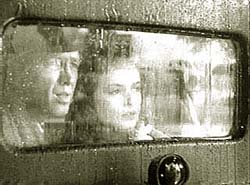After reading Tom Perotta's Little Children eighteen months ago, nothing about it made me think "movie." This is why the gods gave us Todd Field and his producers. In fact, there was a lot of interest in the book as a property before it swam onto the popular sonar. But, according to Field, things heated up after that. Perotta's Election made a terrific cult movie and he has written for the screen before.
My excuse for not spotting the potential in Little Children is, well, doctrine. The central pair of characters do not know what they want. This is the idiot's first lesson of what's wrong with your screenplay: character has no desire; goal is not concrete. I can hear the complaints already. I'll stipulate that in a brainy parsing of character motivation - alright, fine - you could argue that the set of obscure desires that Brad and Sara pursue are real, but submerged and purused subconsciously. Novels excel at this kind of story. Perotta's is one. But this is not a story made for Hollywood.
But in the third act, which is far from happy, characters are startled from their psychic sleep by emotional or physical violence. Each of them wades back into the mess of their lives, not better but no longer fleeing its limitations. Having heard interviews with Todd Field about the movie, he has given us what the book gives us: characters who are admirable and compromised. And that's what makes the end of the story so compelling. Brad, Sara, Larry, and Ronald are headed toward a bad end. But when they arrive, they do their level best, which turns out to be enough to keep them from ruining others' lives and their own.
Here is a fine pair of bookend moments. Early in the movie, Brad joins a late-night football league as the quarterback of the local policemen's team, the Guardians. They face off against CPAs for Brad's first game. The clobbering is a foregone conclusion. We only see the aftermath.
If we had seen the Guardians beaten (putting aside considerations of length for now), we would have been forced to see two things: Brad's relationship with the team, and the significance of the loss. Without these, we see a bruised Brad among teammates, but as isolated as before the game. Without the game, we were spared learning that together they were comic, pathetic, courageous, good-humored. They these would have compelled us to judge Brad, to take his part or build a case against him. Afterward, Brad is invigorated and stunned by the competition, regardless of the loss. Terrific choice.
In the bookend scene when the team finally wins, weeks after he's started an affair with Sara, she launches from the stands as his sole cheerleader. The fizzy fantasy of high school is recapitulated in a way that perfectly dramatizes his self-delusion and vanity. When he asks Sara to run away with him, even she says, "This isn't real."
Throughout, speaking as a guy, watching another guy in the midst of a believable, low-boil crisis, I found few qualities in Brad to admire. But I could not help but recognize the guy, and so identify with his temptations. The way he sidled into what he wanted and hoped for, namely Sara. The way he edged away from his wife and home responsibilities. The way he longed for the skateboarders' ability to defy gravity.
So when Brad makes the choice, even as he leaves his house, not to leave his wife, you feel a tremendous sense of relief. Life does not run downward from stupid mistakes to tragedy. It apparently leaves hope on its way to distress through false hope and then takes a steady uphill grade build of limitations and unalterable fact.
skip to main |
skip to sidebar

Yes, we have RSS feeds!


A hard look at stories to learn about writing movies

Yes, we have RSS feeds!
Principles
It all started with, "I could write a movie that bad." Turns out, even that's hard. So...
- Appreciate what's admirable.
- Identify what's slack; examine why.
- Think fast and publish quickly because writing stories, not blogging, is the real deal.
Affirmations (or "Get off your ass!")
Luck is opportunity plus preparation plus luck. - Jane Espenson ~~ Don't let better be the enemy of good. - John August ~~ The business must eat stories. Don't wait. - Eric Jacobson ~~ The screenplay is a container for money. - John David Roberts ~~ Things are OK when the things you complain about are the things you used to dream about. - Aaron Sorkin
About Me

- John David Roberts
- I'm an experienced learning and OD professional, who's onto the what's new in learning, and in my few hours of spare time I write screenplays.
Seen and Read, 2007 (Screenwriter)
- Jimmy the Gent (Bertram Milhauser)
- To Be or Not to Be (Edwin Justus Mayer)
- The Cabinet of Dr. Caligari (1962, Robert Bloch)
- Notorious (Ben Hecht)
- The Treasure of Sierra Madre (John Huston)
- Down in the Valley (David Jacobson)
- Daddy Long Legs (Henry Ephron, Phoebe Ephron, Jean Webster)
- The Bells of St Mary's (Leo McCarey, Dudley Nichols)
- The Bishop's Wife (Leonardo Bercovici, Charles Brackett, Robert E Sherwood, Billy Wilder)
- Atonement (Christopher Hampton)
- Breach (Adam Mazer, Wm. Rotko, Billy Ray)
- Charlie Wilson's War (Aaron Sorkin)
- Enchanted (Bill Kelly)
- Disturbia (Christopher B Landon, Carl Elsworth)
- Because I Said So (Karen Leigh Hopkins, Jessie Nelson)
- Freaks (Clarence Aaron Robbins)
- Hollywoodland (Peter Bernbaum)
- My Super Ex-Girlfriend (Don Payne)
- The Bourne Ultimatum (Tony Gilroy, Scott Z. Burns, George Nofli)
- Sicko (Michael Moore)
- Knocked Up (Judd Apatow)
- The Island (Caspian Tredwell-Owen, Roberto Orci and Alex Kurtzman)
- The Princess Bride (William Goldman)
- The Wizard of Oz (Noel Langley, Florence Ryerson, Edgar Allen Woolf)
- Ocean's Thirteen (Brian Koppelman, David Levien)
- Broken Flowers (Jim Jarmusch)
- Live Free or Die Hard (Mark Bomback)
- Local Hero (Bill Forsyth)
- Hot Fuzz (Edgar Wright, Simon Pegg)
- Shrek the Third (Andrew Adamson, Howard Gould, Jeffrey Price, Peter S. Seaman, J. David Stern, David N. Weiss, Jon Zack)
- One Crazy Summer (Savage Steve Holland)
- Severance (James Moran, Christopher Smith)
- The Science of Sleep (Michel Gondry)
- Spider Man 3 (Sam and Ivan Raimi, Alvin Sargent)
- The Lives of Others (Florian Henckel von Donnersmarck)
- Jesus Camp (Heidi Ewing, Rachel Grady, dirs.)
- The Holiday (Nancy Meyers)
- Stranger than Fiction (Zach Helm)
- On Broadway (Dave McLaughlin)
- The Pursuit of Happyness (Steve Conrad)
- The Namesake (Sooni Taraporevala)
- The Last King of Scotland (Jeremy Brock, Peter Morgan)
- The Devil Wears Prada (Aline Brosh McKenna)
- The Knack...and How to Get It (Charles Wood)
- Borat (Sacha Baron Cohen, Anthony Hines, Peter Baynham, Dan Mazer)
- The Departed ( William Monahan)
- Zodiac (James Vanderbilt)
- Children of Men (Alfonson Cuaron, Timothy Sexton, David Arata, Mark Fergus, Hawk Otsby)
- The Chronicles of Narnia (Ann Peacock, Andrew Adamson, Christopher Markus, Stephen McFeely)
- The Incredibles (Brad Bird)
- The Goonies (Chris Columbus)
- Letters from Iwo Jima (Iris Yamashita)
- Flags of Our Fathers (Wm. Broyles Jr., Paul Haggis)
- Night at the Museum (Ben Garant, Thomas Lennon)
- Notes on a Scandal (Patrick Marber)
- Man on Fire (Brian Helgeland)
- Pan's Labyrinth (Guillermo del Toro)
- The Painted Veil (Ron Nyswaner)
- Babel (Guillermo Arriaga)
- Blood Diamond (Charles Leavitt)
- The Queen (Peter Morgan)
Screenwriting Bloggers
Labels
- blog news (2)
- comedy (2)
- 2008 awards (1)
- Apatow (1)
- Bateman (1)
- Bill Forsyth (1)
- Bill Kelly (1)
- Christmas (1)
- Dan in Real Life (1)
- Die Hard (1)
- Disturbia (1)
- Enchanted (1)
- Gondry (1)
- Heigl (1)
- Hot Fuzz (1)
- Mira Nair (1)
- Paul Fieg (1)
- Peter Hedges (1)
- Rear Window (1)
- Rogen (1)
- Tambor (1)
- airport (1)
- character (1)
- dream (1)
- genre update (1)
- goal (1)
- heroes (1)
- horror (1)
- ignorance (1)
- irony (1)
- parallel story (1)
- sincerity (1)
- slasher (1)
- sleep (1)
- story (1)
- thriller (1)
- town vs corp. (1)

No comments:
Post a Comment